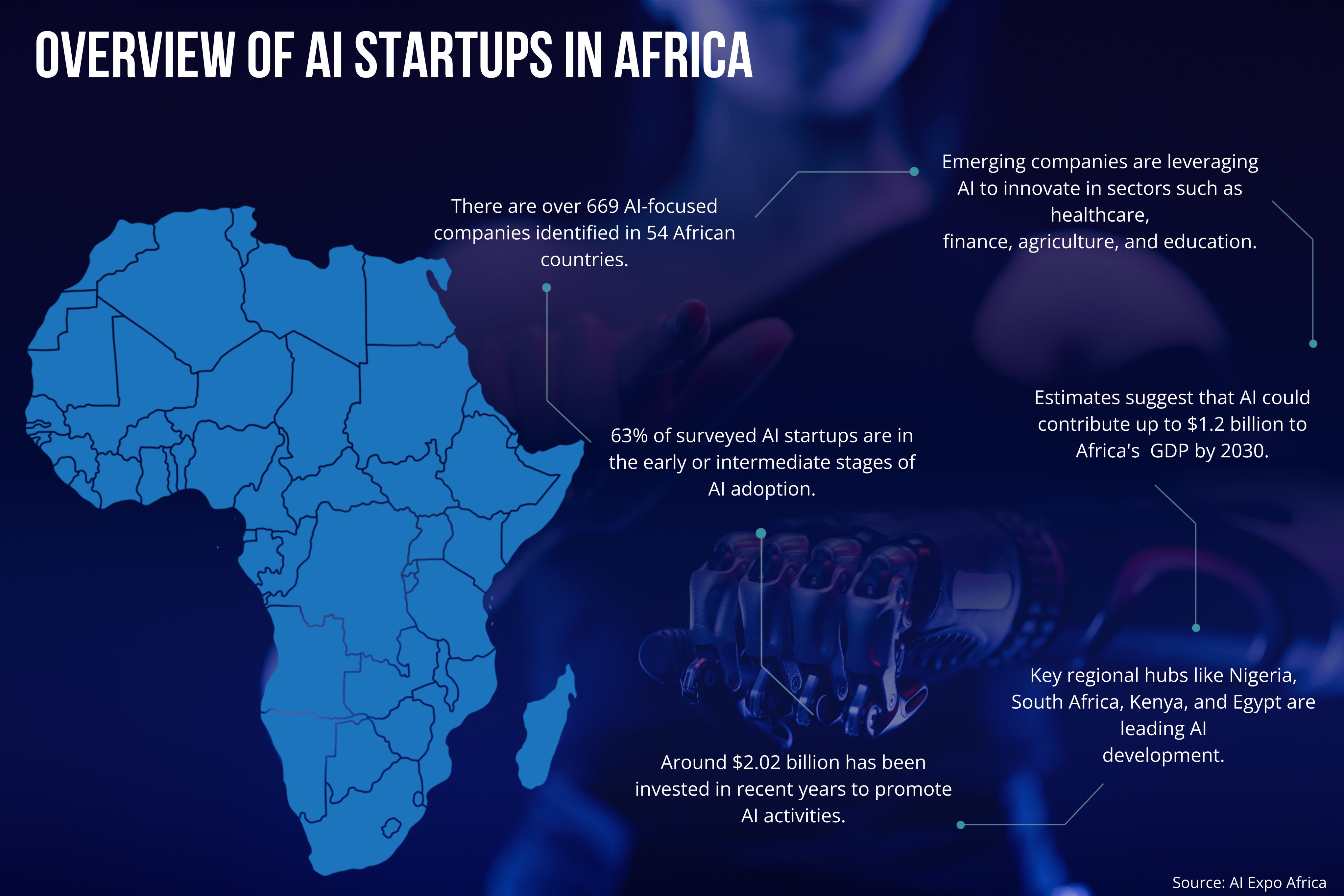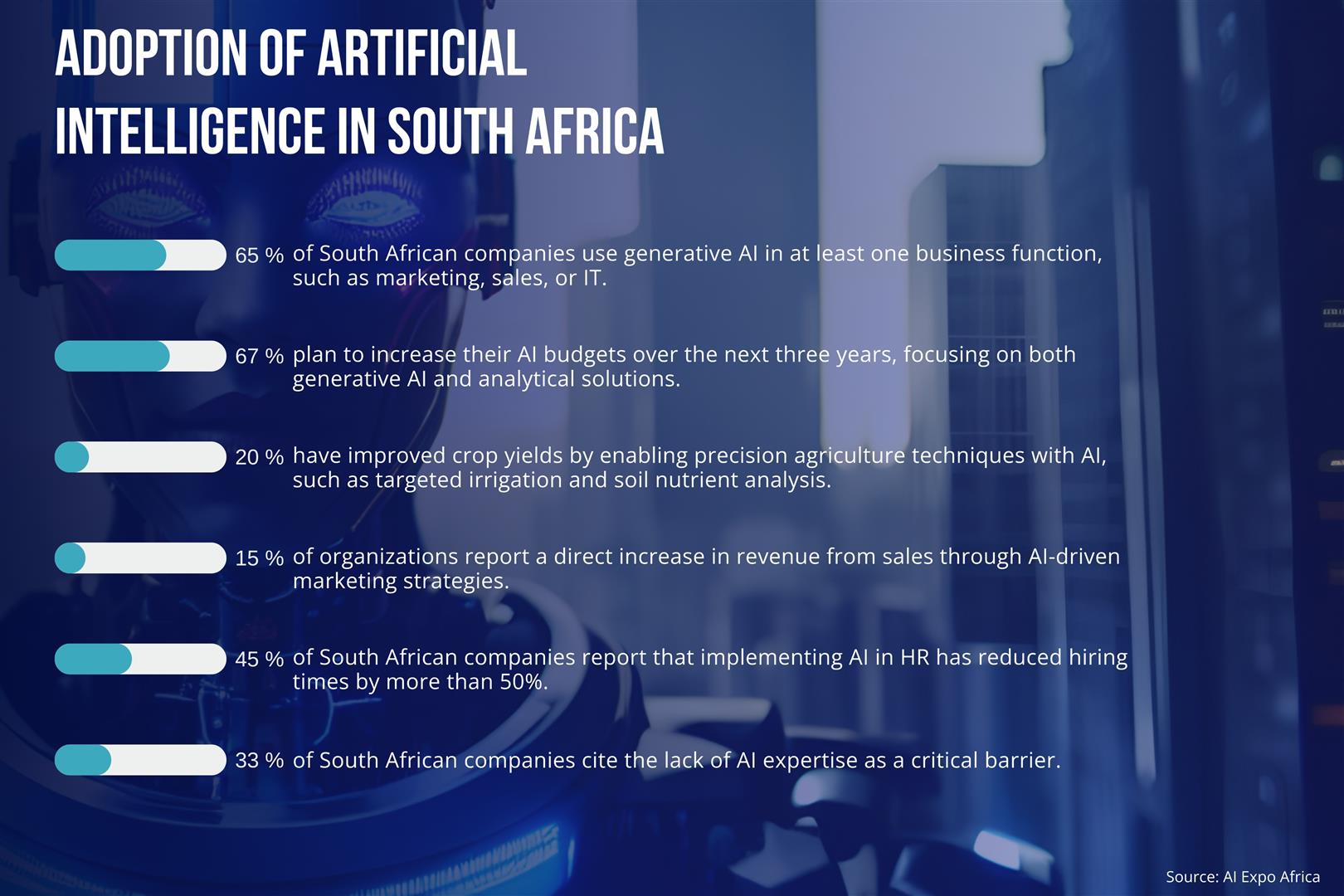BUSINESS NEWS - Artificial intelligence (AI) has emerged as a transformative tool with the potential to revolutionize various aspects of society.
Its ability to mimic human thought and process vast amounts of data has sparked both excitement and concern worldwide.
In Africa, the topic takes on special significance as the continent grapples with challenges and opportunities in integrating this technology into its social and economic development.
Considering South Africa as an example, AI has already proven its utility in critical situations. Tools like Flood Hub, developed by Google’s research center in Ghana, have accurately predicted natural disasters, including recent floods in the Western Cape.
Operating in 23 African countries, this application provides advanced alerts that enhance disaster preparedness and response. In agriculture, applications like PlantVillage are using AI to help small-scale farmers identify pests and diseases in crops, bolstering resilience against climate change.
However, despite the mentioned improvements, access to and adoption of AI in Africa remain behind the Global North.
A report by Research ICT Africa highlights that the lack of robust regulatory frameworks and enabling environments limits the full potential of these technologies.
The report emphasizes the need for regulations that mitigate risks associated with AI, such as providers' lack of accountability and the opacity of algorithms.
At a continental level, African leaders have taken steps to integrate AI into their development strategies. In June 2024, ICT ministers approved the Continental Artificial Intelligence Strategy, aimed at accelerating digital transformation through investments in youth, innovators, and data experts.
By 2030, AI innovation is projected to contribute $1.2 trillion to Africa’s GDP, marking a significant 5.6% increase.
In South Africa, the government has acknowledged AI’s importance through initiatives like the Presidential Commission on the Fourth Industrial Revolution, established in 2020.
While the country has the potential to lead in this field, it faces competition from nations like Nigeria, Mauritius, and Rwanda, which have advanced in formulating AI-specific policies.
Effective implementation of these policies will require sound governance to balance innovation and regulation.
Ethical and sovereignty issues also play a central role in the AI debate in Africa. Data collection and usage raise questions about privacy and fairness, particularly as much of the technology and data come from outside the continent.
Countries like Rwanda have taken steps to ensure data sovereignty, designating certain public records as national assets as part of their digital development strategy.
In South Africa, concerns have arisen over the lack of specific regulations for potentially unsafe AI technologies. Human rights organizations fear that these technologies could exacerbate existing inequalities or be misused for authoritarian purposes.
While laws like the Protection of Personal Information Act (POPIA) offer some safeguards, challenges persist in their implementation and enforcement.
In the same line, the impact of AI on democracy and sovereignty in Africa is another critical issue. Manipulation of narratives through information operations and the spread of misinformation threaten to destabilize fragile states. Examples like the misuse of algorithms in Myanmar, as highlighted by Amnesty International, serve as warnings for policymakers in Africa.
Still, Africa is experiencing a significant AI boom, driven by a surge in startups focused on this technology. According to the Afrilabs report “Mapping AI Startups in Africa”, over 669 startups in 54 countries are transforming key sectors such as healthcare, agriculture, education, and finance.
This is the case of Kenya’s Farmer.Chat, which translates agricultural advice into local languages, and Amini, addressing the scarcity of environmental data. Most of these startups are in early or intermediate adoption stages, showcasing a high potential for accelerated development.
Leading areas include machine learning (30% of specializations), followed by deep learning (17%), natural language processing (15%), and computer vision (12%).
Countries like Nigeria, South Africa, Kenya, and Egypt are leading this transformation with advanced tech ecosystems, while nations like Tanzania and Ghana are emerging by fostering talent and innovation in AI.
AI is not only transforming key sectors but also positioning itself as a vital economic driver for the continent. In recent years, investments in this field have surpassed $2.02 billion, prompting African governments to develop strategies to strengthen digital infrastructure and train talent.
AI Adoption in South Africa
The adoption of artificial intelligence in South Africa is advancing rapidly, making a significant impact in key sectors such as financial services, agriculture, and business operations. Some small and medium enterprises (SMEs) have even opted for personal loans or targeted financing to invest in this emerging technology, leveraging it to enhance processes ranging from automation to service personalization, thereby boosting competitiveness.
A recent study by McKinsey & Company revealed that approximately 65% of South African businesses are already using generative AI in areas such as marketing, sales, and IT—up significantly from 33% the previous year.
Moreover, 67% of these organizations plan to increase their AI budgets over the next three years, reflecting a clear commitment to developing and integrating these technologies. This progress has been fueled by innovative startups such as Aerobotics, specializing in precision agriculture; Envisionit Deep AI, focused on medical diagnostics; and Jumo, offering inclusive financial solutions.
The financial sector has been one of the primary beneficiaries of AI adoption. In a country where 20% of adults lack access to basic banking services and 47% are considered underbanked, AI tools are helping close these gaps.
Chatbots and automated advisory systems provide personalized guidance to users, while advanced algorithms improve credit risk assessments, enabling more people to join the formal financial system.
In agriculture, which contributes 2.5% to South Africa’s GDP and 10% to its exports, AI technologies are revolutionizing operations. Solutions like satellite imaging and machine learning algorithms allow farmers to optimize crop yields, reduce losses from pests, and manage resources more efficiently.
BCG Global reports that these tools have increased agricultural yields by 20%, thanks to precision practices such as targeted irrigation and advanced soil analysis.
AI’s impact also extends to business functions. In marketing and sales, companies have doubled their adoption of AI tools in the past year. These technologies enable personalized customer experiences, with 15% of businesses reporting direct increases in sales revenue.
Predictive analytics has improved sales forecasting accuracy by 30%, helping businesses make better-informed decisions and allocate resources more effectively. In human resources, process automation in talent acquisition and performance analysis has reduced hiring times by over 50%, generating significant cost savings and boosting efficiency.
Despite this rapid adoption, challenges remain. One major concern is data privacy and ethics.
While the Protection of Personal Information Act (POPIA) seeks to regulate data use, only 18% of South African companies have dedicated AI ethics committees. This governance gap poses risks such as algorithmic bias and privacy violations, which have already affected 44% of organizations using these technologies.
Even so, the future of AI in South Africa holds transformative potential—not only economically but also socially. From improving access to basic services to optimizing complex processes in key sectors, AI is proving to be a powerful engine of change for the country.


‘We bring you the latest Garden Route, Hessequa, Karoo news’
















